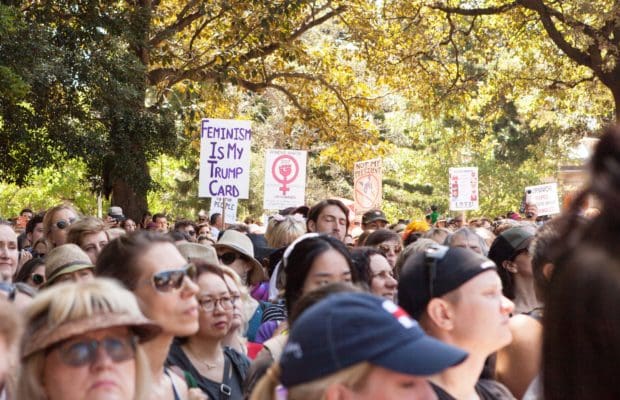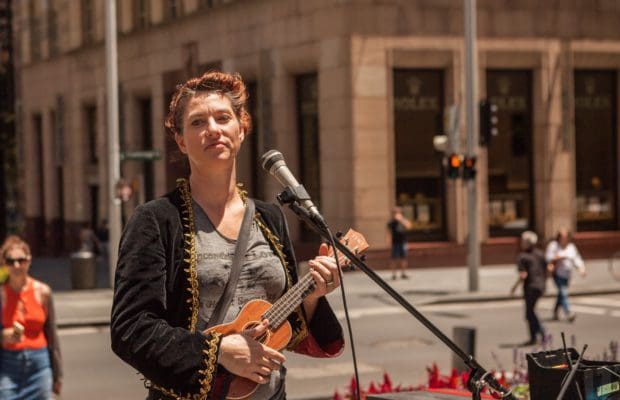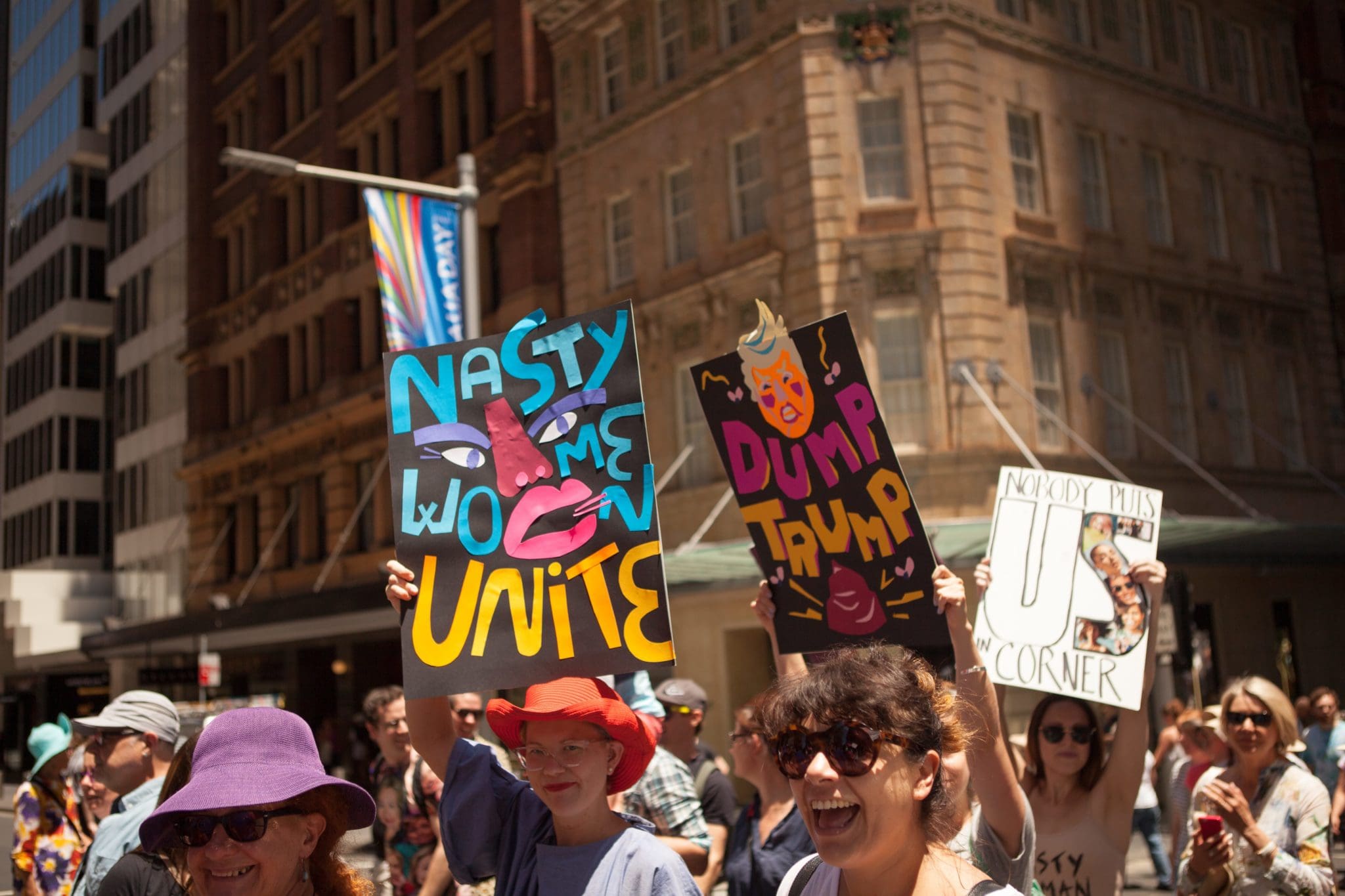On Saturday, thousands of people marched through the CBD in the Women’s March Sydney, organised as one of hundreds of similar events taking place worldwide to protest the inauguration of Donald Trump. The raucous, colourful crowd chanted, danced, and stopped traffic from Hyde Park to Martin Place, gathering marchers as it went.
Women carried signs plastered with feminist quips like ‘Girls just want to have fun & rip the patriarchy a new one’, ‘Pussy Grabs Back’, and ‘If you’re not angry, you’re not paying attention’, the latter accompanied by a rendering of Rosie the Riveter. Chants of “We’re here, we’re loud, we’re women and we’re proud” and “Women, united, will never be divided” went up intermittently, and echoed down city streets.
As the march crossed Elizabeth Street, cries of dismay and exasperation rang out as people began pointing at the sky, where a small plane was spelling out the new president’s name. In response, the crowd began a particularly energetic round of “Dump Trump!!” chanting. After that, few marchers gave the skywriting much attention, save for using it as the backdrop to some very ‘grammable shots of raised middle fingers.

While this march and its sister events were sparked by Trump’s election victory, it was clear from speaking with organisers and attendees that the Sydney event embraced a broad, progressive platform advocating for change here in Australia. March organiser Kate Taylor said “As much as the Americans here are dissenting against Trump today, and we support them in that, for us it’s more about the fight in our local communities… it’s not about who is in power, that comes and goes, what’s important is that we retain the grassroots movement and make sure we preserve our rights.”
Many women were marching out of solidarity with other, more vulnerable people, and feminists who had come before and won difficult fights. Americans Melanie and Katya expressed fear for the already-disadvantaged communities who would suffer most if Planned Parenthood, the largest reproductive health services provider in the United States, was defunded, or if US-style healthcare was introduced here. Katya said “It is the duty of a citizen to protest for people more marginalised”. Mother and daughter from Melbourne, Mandy and Chloe, paid tribute to the feminists who came before them – Chloe told me “Women in history fought and sacrificed for equal rights, and we are acknowledging the work of those people… we don’t want to take those privileges for granted.”
Often the marchers were concerned for their own children. A mother in Hyde Park, said she didn’t want her 5-year old daughter, costumed as Rey from Star Wars, to grow up “in a society where it matters if her skirt is too short”, or where she might not have full reproductive freedom. Rachel, a recent University of Sydney masters graduate from California, said she couldn’t see herself returning home in the near future, because she doesn’t want to raise children under a Trump presidency. She believes that “Trump’s America is not the kind of place I want for my children, especially for a girl.”
When asked why they were protesting the election of a foreign leader who might only have passing effect on their lives, marchers pointed to an international coarsening of public discourse ushered in by Trump. Friends Amanda-Jane and Sophie were worried by what Amanda-Jane called Trump’s “gross, blatant, explicit misogyny”, with Sophie elaborating “It filters down, it gives permission to people to act like that, to think it’s okay to be grossly offensive”. She sees a connection between the public callousness that Donald Trump displays and encourages, and attitudes like those of Australian Attorney General George Brandis, who famously claimed that people have a “right to be bigots”. Chloe, the Melburnian being accompanied by her mother, said “When he says stuff like that [referring to Trump’s infamous “grab her by the pussy’ recording], it’s accepted by the public, and he gets away with it.”

The breadth of marchers’ concerns was reflected in the diversity of the march’s official supporters, with unions, creative arts community groups, NGOs, and feminist advocacy groups all named as partners to the Women’s March on Sydney. Yet intersectionality is complex, and even a broad church has doctrines, a fact of which the organisers of the march in Washington DC were reminded last week. According to widespread reports, the pro-life feminist group New Wave Feminists was initially listed as an official partner of the DC march, along with hundreds of other organisations. After outcry from the feminist community, however, New Wave Feminists was officially disaffiliated from the march, and organisers released a statement stating that the group’s initial inclusion had been an “error”.
Taylor discussed with me whether there had been similar tensions in the organisation of the Sydney march, particularly given groups like ‘Nuns for Refugees’ had been named as affiliates (the Catholic Church remains officially opposed to abortion and most forms of contraception). “Differences came up, and they were addressed”, she said. “A broad church… means a lot of different opinions. I mean, we had people who were Hillary supporters, and those who were anti-Hillary. These are the hard questions of intersectionality”.
Questions of logistics and pragmatics are an issue, too, for a march being held in a city that is leery of large public gatherings. On Friday of last week, it was announced that the Keep Sydney Open rally planned for the same day as the Women’s March had been cancelled, after the NSW Police Commissioner convinced the Supreme Court that the likely crowd for that event (7,000) would be too many people to safely accommodate in its intended Kings Cross location.
I asked Taylor and Brian Peck, the march’s police liaison officer, whether they had difficulties dealing with the police either in the organisational stages or on the day, and both said that police had been cooperative and helpful. Peck noted that despite initial expectations of around 600 attendees, there had been no problem with police accommodating significantly larger numbers on the day. Exact numbers are not available, but a representative of the march, Erin Riley said the best estimates have attendance at 8,000.

Those 8,000 marchers ended up in Martin Place, where Taylor and her fellow organisers Kresta Lokumarambage and Ayebatonye Abrakasa joined Destroy the Joint’s Wendy Frere to outline the acronymic platform ‘HERS’ – Health, Economic security, Representation, Safety – from which they hope to grow a grassroots progressive movement in Sydney. The American singer-songwriter Amanda Palmer, accompanied by her ukulele, sang a freshly composed ditty that name-checked back alley abortions and the 19th century suffragette movement before exhorting the marchers through call and response to “Never… stop!!”
The event officially concluded with local musicians leading the crowd in an emotional rendition of Helen Reddy’s “I Am Woman” and, as the concrete canyon of Martin Place filled with the voices of thousands of women, you could look up at the sky and see that the smoky letters of the new president’s name had blown away, leaving only brilliant Sydney blue.





